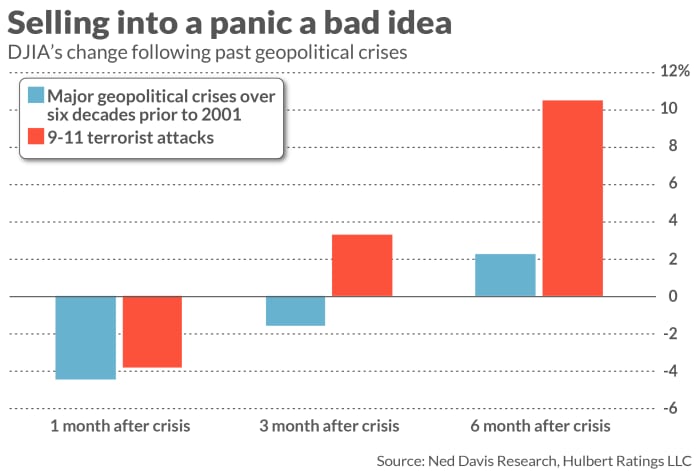The terrorist attacks of Sept. 11, 2001, were the biggest modern shock in the U.S. We were shaken, and in some cases we were changed forever.
The tragic event, in a smaller way, prompted investors to reconsider long-held strategies. What we learned, however, was that it’s usually best for investors to simply do nothing.
To understand why, consider that the Dow Jones Industrial Average DJIA, -0.43% closed at 9,605.51 on Sept. 10, 2001, the day before the attacks. At its low several days later, after the stock market finally reopened after being closed, the Dow was 17.5% lower.
The market recovered quickly. By Oct. 26, six weeks later, the Dow was trading higher than where it closed on Sept. 10.
Even industries that were most hurt by the 9/11 attacks, such as airlines, rebounded in the months following those attacks. Though the NYSE ARCA Airline Index XAL, +2.62% fell by nearly half in the immediate wake of those attacks, it jumped more than 80% over the subsequent six months. In mid-March 2002, the index was just 2.3% below where it closed on Sept. 10, 2001.
Historical pattern
One should never draw a general investment lesson based on one case study. But it turns out that the markets’ behavior in the wake of the 9/11 terrorist attacks is consistent with the historical pattern.
Ned Davis Research studied the 28 worst political or economic crises over the six decades prior to the 9/11 attacks. In 19 cases, the Dow Jones Industrial Average was higher six months after the crisis began. The average six-month gain following all 28 crises was 2.3%.

The accompanying chart summarizes what the Ned Davis study found, along with how the Dow actually performed following the 9/11 attacks. While the Dow in the wake of those attacks performed better than the historical averages, the overall pattern of its performance is consistent with those averages.
It’s worth emphasizing that the Ned Davis study was not an after-the-fact reconstruction. It was produced the day after the 9/11 attacks, before anyone knew that the stock market would quickly recover.
Our instinct, following a black swan event like those attacks, is to immediately dump our holdings and go to cash. If you succumb to that urge, however, you will find yourself selling at the same time everyone else is, often at fire-sale prices.
History teaches us that you’ll most likely be far better off if you instead do nothing in the wake of another crisis like the 9/11 attacks. And you’ll also have more emotional and intellectual energy to devote to the collective healing that will surely be needed.
This is one case in which doing the right thing also is good investment policy.
Mark Hulbert is a regular contributor to MarketWatch. His Hulbert Ratings tracks investment newsletters that pay a flat fee to be audited. He can be reached at mark@hulbertratings.com.
